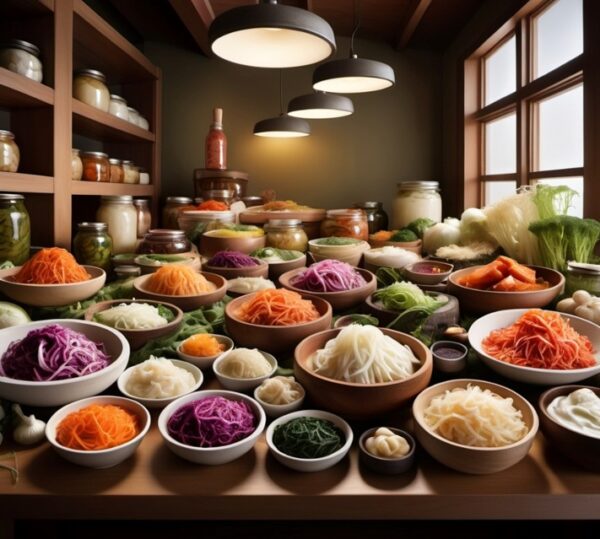Fermented Foods: A Timeless Tradition with Modern Health Benefits
In addition to their health benefits, fermented foods are also contributing to the growing movement towards sustainable food systems. The fermentation process can reduce food waste by extending the shelf life of perishable items, while also allowing for the preservation of seasonal produce for longer periods. For instance, fermenting surplus vegetables into pickles or cabbage into sauerkraut helps reduce food spoilage and waste.

Representative image: Fermented products
Reported & Written By Dr. Sunny Dhiman, Diary Times, Chandigarh, October 08: In an age of fast food and processed meals, a culinary tradition that dates back thousands of years is experiencing a resurgence—fermented foods. Once primarily a method of preserving food, fermentation is now being celebrated for its numerous health benefits, culinary versatility, and environmental sustainability. From kombucha and kimchi to yogurt and sauerkraut, fermented foods are quickly becoming a staple in modern diets around the globe, offering a delicious solution to some of today’s biggest nutritional and environmental challenges.
Fermentation is one of the oldest food preservation techniques, harnessing the power of beneficial microorganisms such as bacteria, yeast, and fungi to convert sugars and carbohydrates into alcohol, acids, and gases. These natural byproducts not only extend the shelf life of food but also enhance its flavour, texture, and nutritional profile.
Many of the world’s most beloved foods are fermented—cheese, bread, beer, soy sauce, miso, and even chocolate. The process not only alters the taste and texture but also boosts the bioavailability of nutrients, meaning that our bodies can more easily absorb the vitamins and minerals present in these foods. One of the main reasons fermented foods have gained popularity in recent years is their profound impact on gut health.
The human gut is home to trillions of bacteria, forming a microbiome that plays a crucial role in digestion, immune function, and even mental health. Fermented foods are rich in probiotics—live beneficial bacteria that help maintain a healthy balance in the gut. Scientific research increasingly points to the benefits of a diverse gut microbiome, linking it to improved digestion, reduced inflammation, and better immune function.
Also Read | Towards Zero Waste: Combating Global Food Wastage for a Sustainable Tomorrow
Consuming fermented foods regularly can help restore this balance, particularly for those who have experienced gut dysbiosis due to antibiotics, stress, or poor dietary habits. Fermented dairy products like yogurt and kefir are known to promote digestive health, while fermented vegetables like kimchi and sauerkraut have been linked to improved immunity and reduced risk of chronic diseases such as heart disease and diabetes.
As interest in gut health grows, so too does the demand for these probiotic-rich foods. Emerging research has also drawn connections between gut health and mental well-being, a concept known as the “gut-brain axis.” The idea that the gut can influence our mood and cognitive function has led to a growing interest in how fermented foods may help manage conditions like anxiety, depression, and stress. The presence of probiotics in these foods is thought to influence the production of neurotransmitters like serotonin, often referred to as the “happy hormone.” This gut-brain connection highlights the potential for fermented foods to play a role in mental health treatment, although more research is needed to fully understand these effects.
Also Read | Millets: The Supergrains Transforming Global Nutrition
In addition to their health benefits, fermented foods are also contributing to the growing movement towards sustainable food systems. The fermentation process can reduce food waste by extending the shelf life of perishable items, while also allowing for the preservation of seasonal produce for longer periods. For instance, fermenting surplus vegetables into pickles or cabbage into sauerkraut helps reduce food spoilage and waste.
Moreover, fermentation requires relatively low energy compared to other food preservation methods, making it an eco-friendly technique. As the global food industry seeks ways to lower its environmental impact, fermentation is emerging as a sustainable practice that also delivers economic benefits for small-scale farmers and artisanal food producers. Beyond health and sustainability, fermented foods also offer rich, complex flavours that enhance culinary experiences.
Get The Latest News Of Himachal First On Mobile, Click Here To Join Our WhatsApp Group
The tanginess of yogurt, the savory depth of miso, and the effervescence of kombucha demonstrate the wide variety of textures and tastes that fermentation can produce. Fermentation adds umami, that elusive fifth taste, which gives many of these foods their distinctive appeal. Fermented foods are not only a growing trend in health food markets but are also finding their way onto the menus of top restaurants worldwide. As we grapple with the challenges of modern living—digestive issues, rising stress levels, and environmental concerns—fermented foods offer a time-tested solution.
Also Read | Taste of Deception: The Rise of Food Adulteration and its Implications
With their proven health benefits, sustainable production methods, and culinary versatility, they are perfectly poised to meet the demands of today’s health-conscious, eco-minded consumers. While fermentation may be an ancient technique, its potential in the modern world is only beginning to be fully appreciated. From promoting gut health to reducing food waste and offering a wide range of flavours, fermented foods are more than just a trend—they are a powerful tool for better living.
As more people embrace these nutrient-dense, flavourful foods, the future of fermentation looks brighter than ever, bridging the gap between tradition and modern science for a healthier, more sustainable world.
Be Part of Quality Journalism
| Quality journalism takes a lot of time, money and hard work to produce and despite all the hardships we still do it. Our reporters and editors are working overtime in Himachal and beyond to cover what you care about, break big stories, and expose injustices that can change lives. Today more people are reading Diary Times than ever, but only a handful are paying while advertising revenues are falling fast. |

Associate Professor, Department of Biotechnology, Chandigarh University, India.








